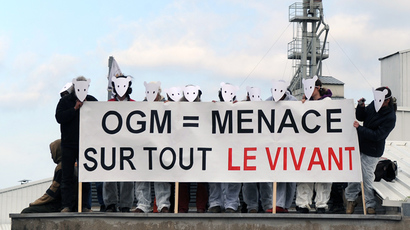EU fear of GM food from US hampers historic trade deal

An ‘enormous gulf’ has been exposed between the EU and the US through Europe’s reluctance to buy hormone meat or GM food from the US. Industry and labor groups voiced concern to EU and US negotiators that the globe’s biggest trade pact was under threat.
“There is an enormous gulf between the EU and US positions,” said Michael Dolan, a lobbyist for the US Teamsters Union at the fourth round of trade talks between the EU and US in Brussels on Wednesday.
The talks marked an unusual occasion, being the first time that lobbyists were received, and additionally marking the first time that the forum allowed reporters inside.
Those involved in negotiating a pact have expressed a desire to finalize a deal before the end of the year. Eight months of talks have already passed. However, tensions which have underscored trade talks worldwide have been a drawback, and continued low public support for the deal has exacerbated tensions over food.
Despite this, its supporters say the deal would lead to some $100 billion per year in growth on both sides, and the EU says that ‘Transatlantic Trade and Investment Partnership’ (TTIP) is under threat from protesters it deems ‘anti-globalization’.
In 2012, the EU exported $16.6 billion in farm produce to the US, while US farmers delivered $9.9 billion to Europe. The gap was largely blamed on the EU ban on GM food imports.
“Our trade could be way bigger,” Douglas Nelson, a CropLife America adviser told Reuters. “The TTIP is a way to normalize trade with the European Union.”
However, EU Trade Commissioner Karel De Gucht frequently reasserts that there will be no changes to the EU regulation of GM food even if an agreement is reached with the US.
The EU is also closed to US beef from cattle raised with growth hormones.
On March 10, the UK’s Department for Environment, Food and Rural Affairs (DEFRA) secretary, Owen Paterson, added his backing to an EU proposal that may prompt the fast-tracking of GM crops for commercial cultivation in the country.
Greenpeace, Friends of the Earth, GM Freeze, the Soil Association and GeneWatch UK added their signatures to a letter to UK Prime Minister David Cameron condemning the plans.
GeneWatch UK director, Helen Wallace, stated that Monsanto and other GM companies were “desperate to push their GM crops into other countries before the devastating impacts on wildlife and farming destroy existing markets,” according to local publication Farmers Weekly.














